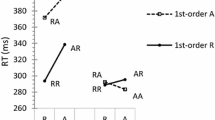Abstract
Two experiments addressed whether response latency in a trial of the lexical decision task is independent of the lexical status of the item presented in the previous trial. In Exp. 1, it was found that both word and nonword responses were significantly slower when the previous trial had involved a nonword than when it had involved a word. In Exp. 2, which employed a different list composition, it was found that responses to nonwords and pseudohomophones were significantly slower when the previous trial had involved a nonword or a pseudohomophone than when it had involved a word. However, responses to words were not influenced by the nature of the previous trial. We concluded that sequential dependencies exist across consecutive trials in the lexical decision task even when there is no semantic, morphological, phonological, or orthographic relationship between the items presented during those trials.
Similar content being viewed by others
References
Balota, D. A., & Chumbley, J. I. (1984). Are lexical decisions a good measure of lexical access? The role of word frequency in the neglected decision stage. Journal of Experimental Psychology: Human Perception and Performance, 10, 340–357.
Chumbley, J. I., & Balota, D. A. (1984). A word's meaning affects the decision stage in lexical decision. Memory and Cognition, 12, 590–606.
Dorfman, D., & Glanzer, M. (1988). List composition effects in lexical decision and recognition memory. Journal of Memory and Language, 27, 633–648.
Forbach, G. B., Stanners, R. F., & Hochhaus, L. (1974). Repetition and practice effects in a lexical decision task. Memory and Cognition, 2, 337–339.
Forster, K. I., & Davis, C. (1984). Repetition priming and frequency attenuation in lexical access. Journal of Experimental Psychology: Learning, Memory, and Cognition, 10, 680–698.
Fowler, C. A., Napps, S. E., & Feldman, L. B. (1985). Relations among regular and irregular morphologically related words in the lexicon as revealed by repetition priming. Memory and Cognition, 13, 241–255.
van der Heijden, A. H. C., Hagenaar, R., & Bloem, W. (1984). Two stages in postcategorical filtering and selection. Memory and Cognition, 12, 458–469.
Kahneman, D., & Henik, A. (1981). Perceptual organization and attention. In M. Kubovy and J. R. Pomerantz (Eds.), Perceptual organization. Hillsdale, NJ: Erlbaum.
Kucera, F., & Francis, W. N. (1967). Computational analysis of present-day American English. Providence: Brown University Press.
Laming, D. (1973). Mathematical psychology. New York: Academic Press.
Landauer, T. K., & Freedman, J. L. (1968). Information retrieval from long-term memory: Category size and recognition time. Journal of Verbal Learning and Verbal Behavior, 7, 291–295.
McCann, R. S., Besner, D., & Davelaar, E. (1988). Word recognition and identification: Do word-frequency effects reflect lexical access? Journal of Experimental Psychology: Human Perception and Performance, 14, 693–706.
McKoon, G., & Ratcliff, R. (1992). Spreading activation versus compound cue accounts of priming: Mediated priming revisited. Journal of Experimental Psychology: Learning, Memory, and Cognition, 18, 1155–1172.
McNamara, T. P. (1992). Theories of priming: I. Associative distance and lag. Journal of Experimental Psychology: Learning, Memory, and Cognition, 18, 1173–1190.
Meyer, D. E., & Schvaneveldt, R. W. (1971). Facilitation in recognizing pairs of words: Evidence of a dependence between retrieval operations. Journal of Experimental Psychology, 2, 227–234.
Meyer, D. E., Schvaneveldt, R. W., & Ruddy, M. G. (1974). Functions of graphemic and phonemic codes in visual word-recognition. Memory and Cognition, 2, 309–321.
Neely, J. H., Keefe, D. E., & Ross, K. L. (1989). Semantic priming in the lexical decision task: Roles of prospective prime-generated expectancies and retrospective semantic matching. Journal of Experimental Psychology: Learning, Memory, and Cognition, 15, 1003–1019.
Remington, R. J. (1969). Analysis of sequential effects in choice reaction times. Journal of Experimental Psychology, 82, 250–257.
Rubenstein, H., Garfield, L., & Millikan, J. A. (1970). Homographic entries in the internal lexicon. Journal of Verbal Learning and Verbal Behavior, 9, 487–494.
Scarborough, D. L., Cortese, C., & Scarborough, H. S. (1977). Frequency and repetition effects in lexical memory. Journal of Experimental Psychology: Human Perception and Performance, 3, 1–17.
Seidenberg, M. S. (1990). Lexical access: Another theoretical soupstone? In D. A. Balota, G. B. Flores d'Arcais, and K. Rayner (Eds.), Comprehension processes in reading (pp. 33–71). Hillsdale, NJ: Erlbaum.
Shulman, H. G., Hornak, R., & Sanders, E. (1978). The effects of graphemic, phonetic, and semantic relationships on access to lexical structures. Memory and Cognition, 6, 115–123.
Stadler, M. A., & Logan, G. D. (1989). Is there a search in fixed-set memory search? Memory and Cognition, 17, 723–728.
Stanners, R. F., Forbach, G. B., & Headley, D. B. (1971). Decision and search processes in word-nonword classification. Journal of Experimental Psychology, 90, 45–50.
Stone, G. O., & Van Orden, G. C. (1992). Resolving empirical inconsistencies concerning priming, frequency, and nonword foils in lexical decision. Language and Speech, 35, 295–324.
Author information
Authors and Affiliations
Corresponding author
Rights and permissions
About this article
Cite this article
Lima, S.D., Huntsman, L.A. Sequential dependencies in the lexical decision task. Psychol. Res 60, 264–269 (1997). https://doi.org/10.1007/BF00419412
Received:
Accepted:
Issue Date:
DOI: https://doi.org/10.1007/BF00419412




